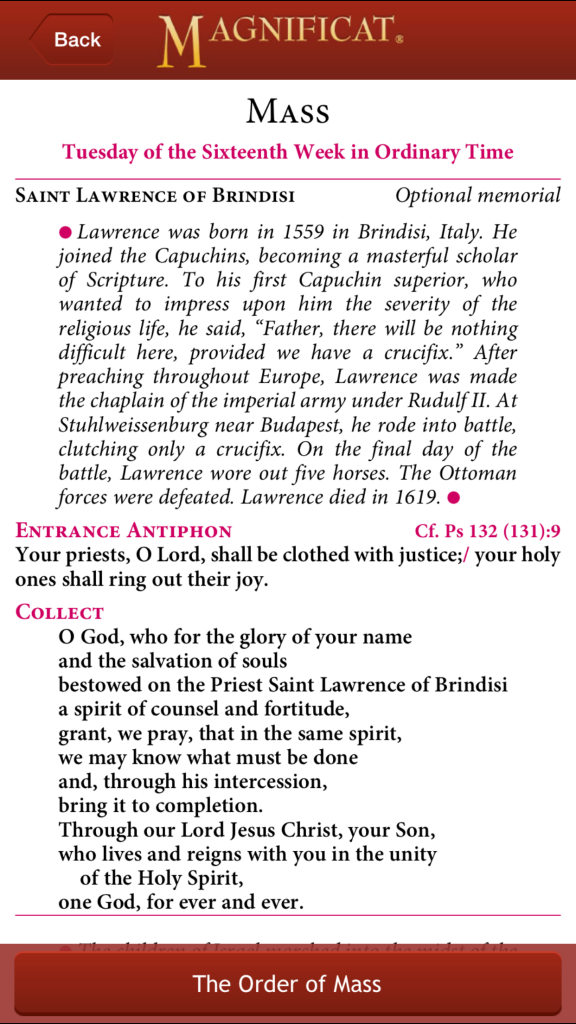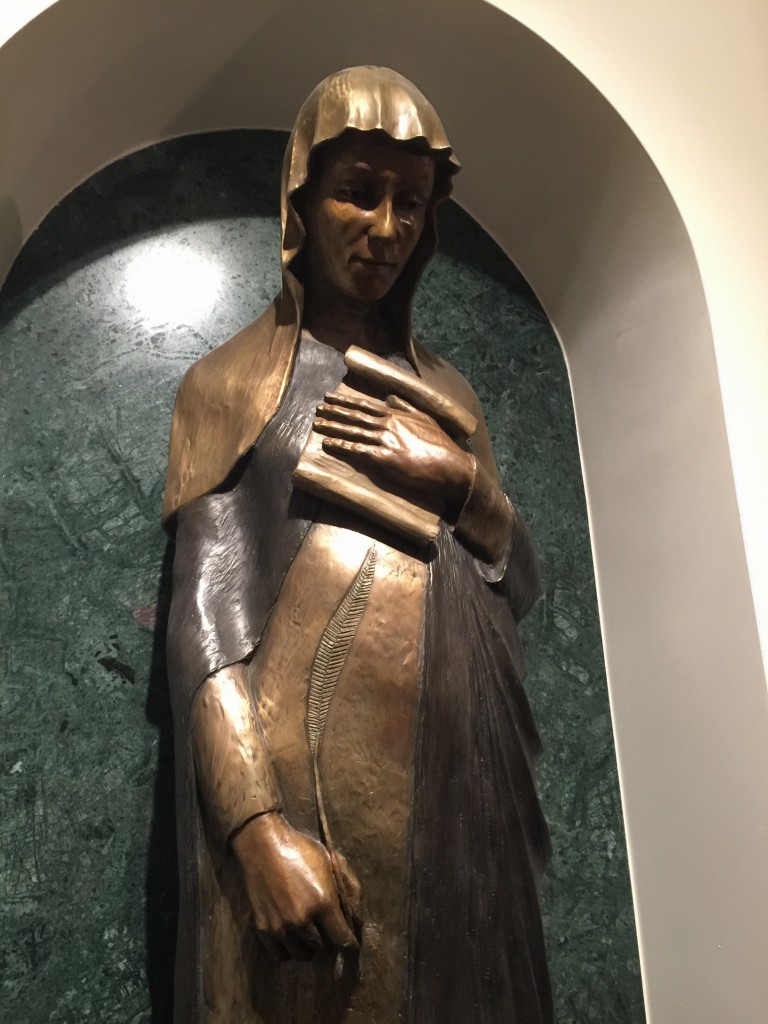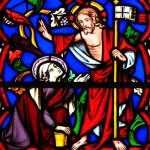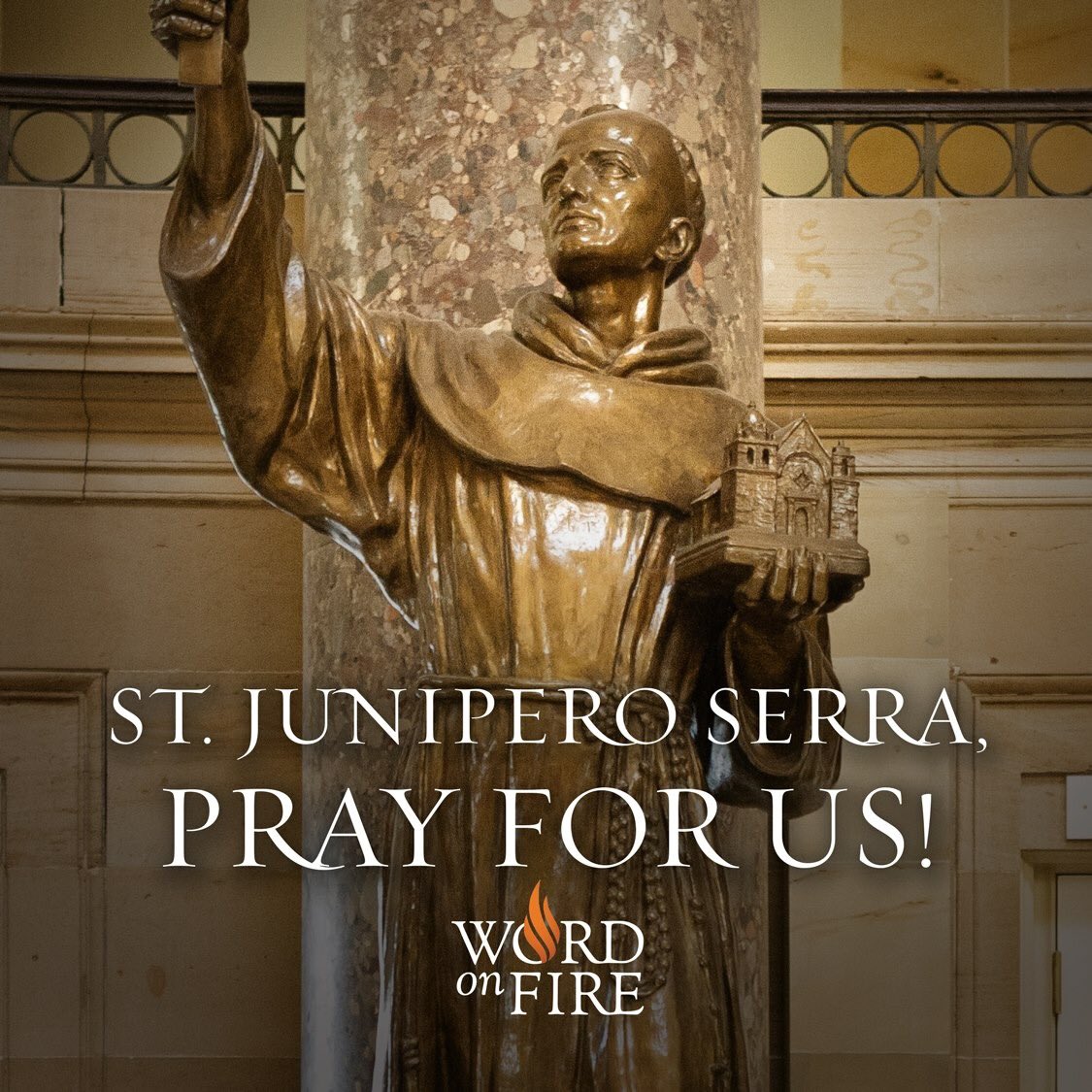1.
Jesus, come to the lonely, the unloved, those without friends; show them your love, help them to care for their brothers and sisters. #lauds
— Fr. Patrick Brennan (@Pathound) July 21, 2015
2. Today is the feast of St. Lawrence of Brindisi.
Here’s how Magnificat writes him up today:
Here’s more from New Advent.
3. He preached, via the Liturgy of the Hours today:
There is a spiritual life that we share with the angels of heaven and with the divine spirits, for like them we have been formed in the image and likeness of God. The bread that is necessary for living this life is the grace of the Holy Spirit and the love of God. But grace and love are nothing without faith, since without faith it is impossible to please God. And faith is not conceived unless the word of God is preached. Faith comes through hearing, and what is heard is the word of Christ. The preaching of the word of God, then, is necessary for the spiritual life, just as the planting of seed is necessary for bodily life.
Christ says: The sower went out to sow his seed. The sower goes out as a herald of justice. On some occasions we read that the herald was God, for example, when with a living voice from heaven he gave the law of justice to a whole people in the desert.
On other occasions, the herald was an angel of the Lord, as when he accused the people of transgressing the divine law at Bochim, in the place of weeping. At this all the sons of Israel, when they heard the angel’s address, became sorrowful in their hearts, lifted up their voices, and wept bitterly. Then again, Moses preached the law of the Lord to the whole people on the plains of Moab, as we read in Deuteronomy. Finally, Christ came as God and man to preach the word of the Lord, and for the same purpose he sent the apostles, just as he had sent the prophets before them.
Preaching therefore, is a duty that is apostolic, angelic, Christian, divine. The word of God is replete with manifold blessings, since it is, so to speak, a treasure of all goods. It is the source of faith, hope, charity, all virtues, all the gifts of the Holy Spirit, all the beatitudes of the Gospel, all good works, all the rewards of life, all the glory of paradise: Welcome the word that has taken root in you, with its power to save you.
For the word of God is a light to the mind and a fire to the will. It enables man to know God and to love him. And for the interior man who lives by the Spirit of God, through grace, it is bread and water, but a bread sweeter than honey and the honeycomb, a water better than wine and milk. For the soul it is a spiritual treasure of merits yielding an abundance of gold and precious stones. Against the hardness of a heart that persists in wrongdoing, it acts as a hammer. Against the world, the flesh and the devil it serves as a sword that destroys all sin.
4. Magnificat’s reflection:
The first lesson taught us by Paul is that we are called to the grace of baptism not because of the merits of our good works but solely because of the goodness of God, not because of any righteous deeds we had done but because of his mercy…. Peter and Andrew are called, not from the Temple where they were praying or sacrificing or engaging in works of piety and mercy and love, but called from the sea where they were rowing and diligently plying their trade of catching fish. Fishing requires no special kind of holiness and virtue.
Moreover, Paul tells us that in baptism a regeneration and renovation takes places through the bath of rebirth and renewal by the Holy Spirit, which makes us very like to Christ in our life, our conduct, and our works, because it was to this that we have been predestined. Consequently, he writes to the Galatians: All of you who are baptized into Christ have clothed yourselves with Christ. To clothe oneself with Christ, however, means to reflect Christ and make him visible in our life and conduct….
If the virtue and righteousness and holiness of the Apostles and all the saints is merely imaginary, does that mean that Christ is, therefore, merely an imaginary Redeemer and Savior? That Adam and Satan had much more power to destroy than Christ and God have to save? If the power of the Holy Spirit in the Apostles was only imaginary, how were they able to perform real works of virtue? Can an imaginary or a painted tree bear real fruits?… These are fruits that were truly present in the Apostles…. The Apostles and countless martyrs have already laid down their lives for Christ and suffered cruel torments for the sake of righteousness with great patience and strength of soul and constancy and, even more, with love and a spirit of joy… and with a great desire to suffer even much more.
5. A homily from yesterday: Unholy Obstinacy Versus Holy Perseverance
6. Did you know about Saint Apollinaris? His feast day was yesterday. Some things here.
Speaking of (#OPPower): St. Catherine of Siena looks weary here (at the Catholic Information Center in Washington, D.C.):
Perhaps you can ask her to walk with you in intercessory prayer if you are.
8.
The Holy Spirit is a fire in each of the seven sacraments. [WMOFC]
— Bishop Barres (@BishopBarres) July 21, 2015
9.
May the Lord bless @FrRobertBarron who was just appointed Auxiliary Bishop of the Archdiocese of Los Angeles. Please pray for him!
— Word On Fire (@WordOnFire) July 21, 2015
10. This sure is timely from the Liturgy of the Hours, from St. Ignatius of Antioch:
Remember, then, the Church in Syria, that it may be strengthened through your prayers.
PLUS: I include this because it is wise:
"Trying to fill the God-sized hole in our hearts with things other than God…" #dailyeSpiration from Peter Kreeft pic.twitter.com/I9E4nrffS2
— Steubenville (@go2steubenville) July 19, 2015
And because it is an excuse to link to this recent Q&A I did with Kreeft.














